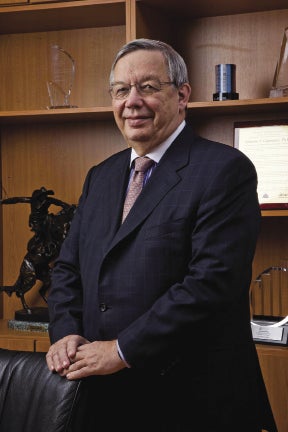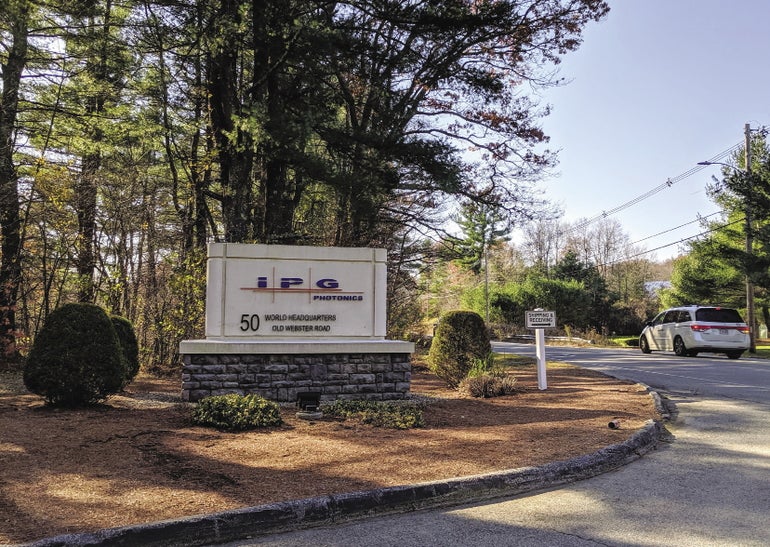The severing of economic ties between the U.S. and Russia is likely to prove a challenge for IPG Photonics, which was founded in Russia and has long-standing ties to the country.
Get Instant Access to This Article
Subscribe to Worcester Business Journal and get immediate access to all of our subscriber-only content and much more.
- Critical Central Massachusetts business news updated daily.
- Immediate access to all subscriber-only content on our website.
- Bi-weekly print or digital editions of our award-winning publication.
- Special bonus issues like the WBJ Book of Lists.
- Exclusive ticket prize draws for our in-person events.
Click here to purchase a paywall bypass link for this article.
As Russia’s attacks on Ukraine rage on, the U.S. and its NATO allies are clamping down on Russian oligarchs and their vested economic interests, through the use of sanctions aimed to debilitate the Russian economy. For U.S.-based companies, this means divesting from their business operations in Russia. This severing of economic ties between the U.S. and Russia is likely to prove a challenge for IPG Photonics, the Oxford-based manufacturing company.

The company, which manufactures fiber lasers, has deep ties to Russia: It was founded there in 1990 by Valentin Gapontsev, who before his death in 2021 was one of the 12 wealthiest people in the state of Massachusetts, with a net worth of $2.8 billion as listed by Forbes. According to the company’s most recent annual and quarterly reports, it employs a little more than 2,000 people in Russia and Belarus, most of whom are based at its location in Fryazino, a suburb of Moscow and a hub for scientific developers.
Nikolay Todorov, a senior research analyst who covers IPG at Longbow Research in Cleveland, said while most of the company’s finished products are made in the U.S., many of those product’s components are made in Russia and then shipped abroad. Disruption or banning of trade between the U.S. and Russia, therefore, would have an impact.
“It’s a bigger challenge getting products in and out of Russia at the moment,” he said. “Many shipping companies have stopped serving those logistical routes for facilities in Russia.”
IPG Photonics declined to comment for this story.
Reading the tea leaves
Since Russia invaded Ukraine on Feb. 24, the stock price of IPG has fallen 25% on the Nasdaq from $133.63 per share on the day of the invasion to $100.78 on May 9. This fall has outpaced the Nasdaq Composite of all the stocks' prices on the exchange, which fell 14% over the same time period.
IPG’s shares did have a minor rebound on May 3, following the release of its first quarterly report of 2022. The company has stated 1% of its cash balance is in Russia, and it was suspending capital investments in Russia other than for maintenance and non-material items. IPG has been building up inventory at its Russian facilities for critical components needed for production, perhaps in anticipation of worsening U.S.-Russia ties.
If the war and sanctions drag on and inventory dwindles, the company could face more of an impact, Todorov said.
“The company has been reading the tea leaves, and before the Ukraine conflict, they built up about six months worth of inventory,” said Todorov. “Getting components into Russia is not an immediate problem, but the opposite is a little bit of a bigger challenge.”
In its financial filings, IPG said it was being investigated by the U.S. Department of Justice regarding certain shipments of equipment. IPG did not say where or when the shipments took place, but followed up by saying any disruption with its Russian operations could affect production.
Complicated relationships
IPG holds few ties to Vladimir Putin and the Kremlin, as Gapontsev said in 2019 he only ever met Putin once in 2011 to receive an award for his scientific contributions, although it wasn’t his only encounter with the Russian government. In 2009, he hosted then-Russian President Dmitry Medvedev at an IPG facility in Fryazino.
IPG’s Russian operations at one point had substantial investments from Rusnano, a company led by oligarch Anatoly Chubais, although IPG reacquired most of those shares in 2012. Chubais was one of the few oligarchs to condemn the war in Ukraine and has since fled Russia.
IPG has put out statements voicing concern about the conflict in Ukraine, without necessarily condemning Russia, such as in its 2022 annual letter to shareholders.

“We are of course following the tragic situation in Ukraine closely and hope for a swift end to this conflict,” IPG CEO Eugene Scherbakov wrote. “To be clear, our business and ability to fulfill orders are not heavily reliant on our supply chain from Russia. However, we are taking all necessary precautions to mitigate potential risks posed by sanctions.”
IPG has links to the U.S. government as well. Agencies such as the U.S. Department of Defense and NASA have contracted with IPG many times over the past years, with prime award contract amounts going as high as $3 million, according to federal spending data obtained from the U.S. Department of the Treasury.
“IPG products are used either for advanced research with [U.S.] government agencies or for defense applications with the military,” said Todorov. “The Russian government may see that as a threat, or in any sense a problem, and their Russian operations may face consequences for that.”
Over the past decade, the company has conducted 166 total transactions and received more than $23 million in prime contract awards and purchase orders with federal agencies, most of which fall under the Department of Defense. IPG has earned millions more in federal subprime contract awards, although these do not involve directly dealing with the U.S. government.
The most recent government agency to contract with IPG is the U.S. Department of Commerce, which purchased a $25,000 laser for the National Institute of Standards and Technology on April 7. The U.S. Navy made two orders in early 2021 with end dates scheduled for March 2, 2022, after Russia had begun its assault on Ukraine. This includes a $750,000 order for the company’s fiber lasers, which were sent to the Naval Surface Warfare Center in Dahlgren, Va. An additional $85,000 order for a laser pulsing shaping system was made by the Navy during this time, an order with a scheduled end date of June. The Navy confirmed the purchases.
In addition to its U.S. and Russian properties, IPG has operations in other countries, including Germany, Italy, and China. China serves as the largest market for IPG, making up for about 35% of its revenue, according to the company’s most recent financial reports.
Todorov said about 20% of all IPG’s products for the Chinese market originate solely from its Russian facilities.

